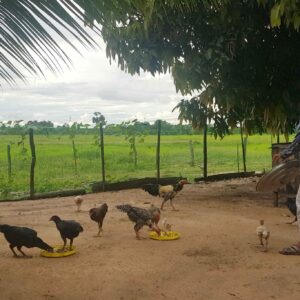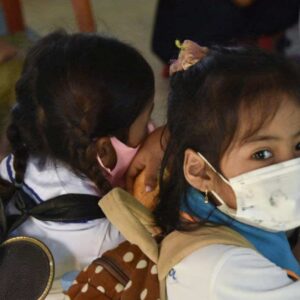Education is a fundamental human right and an essential foundation for the realisation of all other human rights. While Cambodia has dedicated considerable human resources to promoting access to quality education, there is still a sizable population of out of school children even before the pandemic. Here at Aide et Action, we thrive to ensure and promote access to quality education for the most vulnerable and marginalised children and populations through multi-sectoral partnerships to accelerate quality education for all by 2030.
According to UNICEF, more than 140 million children across Southeast Asia have had their education disrupted since the beginning of the pandemic, which leads to their future being at risk. Even prior to the coronavirus pandemic, Cambodia was already behind in meeting the United Nations Sustainable Development Goal (SDG) 4 on quality education.

Since 2014, Aide et Action Cambodia has been leading The Cambodian Consortium For Out Of School Children, a consortium project currently comprising approximately 30 local and international nonprofit organisations. In partnership with Educate a Child, a global programme of the Education Above All Foundation, the Consortium is addressing barriers that limit marginalised children from education through initiatives such as building schools in remote areas, providing in-kind support for marginalised girls and boys, supporting the integration of children with disabilities into public schools, and developing an Accelerated Learning Program for overage learners.
Complementing this work is another consortium project – The Consortium for Sustainable Alternatives And Voice for Equitable Development (CO-SAVED) – led by Aide et Action in partnership with The European Union – which comprises more than 20 civil society organisations and 17 private sector and social enterprises, offering an innovative approach to drive progress toward the UN sustainable development goals in Cambodia for the next four years through sustainable economic development, enhanced service delivery, and green growth.

Through our multi-sectoral approach, the partners we work with are ensuring the continuity of education even during school closures brought by the pandemic. Our partner Bondos Komar is devoted to enabling Cambodian children and youth to access early childhood care and development in important areas like Kandal, Kampong Speu, Takeo, Siem Reap, and Pursat provinces. Bondos Komar is promoting children’s education in primary and preschool in rural areas by supporting community preschools and offering training to preschool teachers to help them further their skills in classroom administrative management and pedagogy techniques.
Recognising that school infrastructure is crucial in ensuring students safely return to and stay in education, our consortium projects are currently refurbishing classrooms in dozens of primary schools across the country as well as investing in new teaching and learning materials, handwashing stations and water filters in the early stages of school and preschool re-opening.

“My dream for my students is to have a proper preschool building that I can manage, improve, and there are enough [learning] supplies for everyone,” said Pan Saorith, 35, a community preschool teacher in Sihanoukville.
In Banteay Meanchey and Prey Veng provinces, we are working in partnership with local nonprofit Damnok Toek, whose mission is also to help marginalised children in four main locations (Neak Loeung, Kep, Poipet, and Phnom Penh), to support 1,260 vulnerable, out of school children to access equitable, quality, and relevant primary education. This month, we are beginning the construction of a new learning centre in Poipet city, Banteay Meanchey province, to offer at-risk students a safe space for street children and migrant children, their caregivers, and other youth in the community to access education. The centre will run an equivalency learning program, offer in-kind or scholarship support and offer vocational training to help integrate out of school children into state school.
In a developing country like Cambodia, civil society and nonprofit organisations like ours continue to play a particularly important role in assisting the government to complete its missions and achieving inclusive education for some of the most vulnerable communities.
“Civil society organisations’ engagement is very important because [the] government cannot fully support the education sector on their own yet. ,” said Eng Samrith, director of the Provincial Association of Local Councils for Pursat Province.
He added, “There is a need for support from civil society organisations in order to fill in the gaps in terms of supporting and implementing activities to achieve education for all.”





